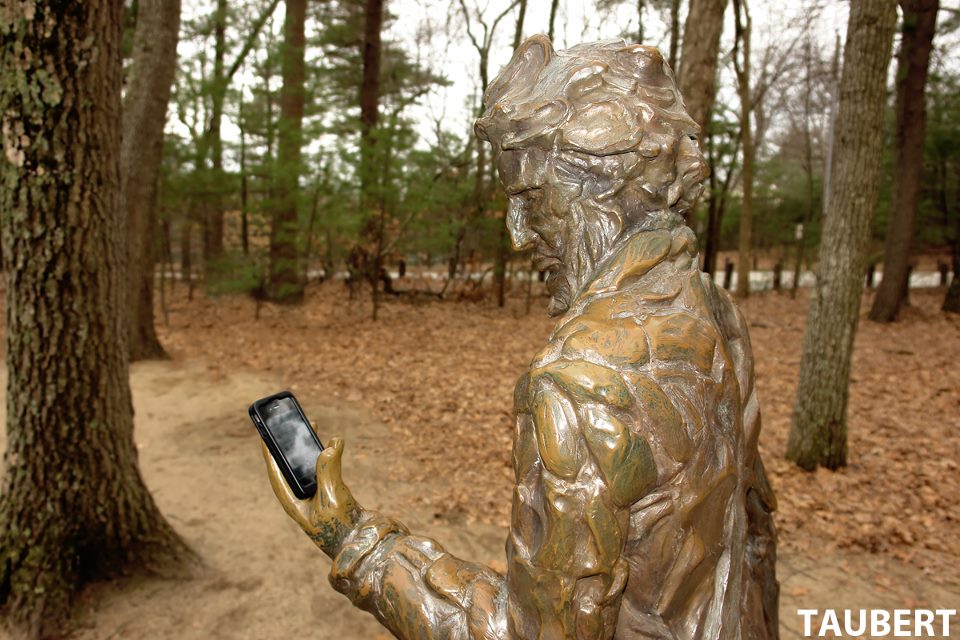Getting Outside Saturday: Random Associations and The Wired Woods
categories: Cocktail Hour
1 comment
Yesterday I saw the season’s first painted bunting. Blazing red belly from below.
The better part of the day, however, was spent on the phone with my friend Hones, whose house is 1500 feet or so from the boat where the bombing suspect was finally apprehended. Hones is celebrating that apprehension by going fishing at Wachusett Reservoir this morning (he might be there by now actually). He has promised to write a firsthand account for Bill and Dave’s very soon.
I learned of the events, both the marathon and the chase, through social media, a first for me. And I followed it there, too. I’m not sure what this means.
This morning I was mulling on these things. Then I put the mulling aside and went to Facebook, where I saw this photo that Eric Taubert (great title for his website by the way) had posted:

This made me think about all the time I am spending staring at screens these days. And about a long essay about Thoreau and cell phones that I published not long ago on this website. Here’s the short version, originally published in OnEarth.
THE WIRED WOODS
A few years ago I ran into a nature writer whom I greatly admire. When I suggested that we exchange cell phone numbers, he told me he’d resisted buying one, and then he quoted Henry David Thoreau: “It is best to avoid the beginnings of evil.” His tongue was partly in cheek, as was Thoreau’s when he wrote those words, since Henry was referring to his decision not to buy a doormat for the cabin. But when I saw my friend again this summer he had a cell phone in hand, “for emergencies.” And so we all, even the most resolute, slide down the slippery slope. First a doormat, then what?
Like Thoreau, I have traveled a good deal in Concord. During my last visit I was in the midst of a book tour, which consisted mostly of manically waving my arms around and yelling, “Hey, look at me,” and which required almost constant updating of my all-important status on Facebook and Twitter, not to mention my blogs and my website. It seemed of vital importance that everyone know what I was doing at every second. If not … well, if not, then what? Oblivion?
Despite my electronic commitments, I did manage to make it to Walden. I also made it to Emerson’s house — where a fellow member of the house tour, a man with a prow of a nose, turned out to be Ralph Waldo’s great-great-grandson — before strolling across the street to Wayside, where Nathaniel Hawthorne once lived. There I found a sign at the bottom of a steep hill announcing that up above was “the Larch Path where Hawthorne trod daily … to formulate as he paced to and fro the plots for his marvelous romances.” I hiked up the hill, kicking up the humus of the previous year’s leaves topped with that fall’s lighter layer, and thought about how, for many people, walking is connected to creation, our minds working better in movement.
Inspired, the next morning I left cell phone and computer behind and headed out to Flint’s Pond, a favorite haunt of Thoreau’s. As I walked I thought of those great nineteenth-century writers, and found myself envying their homes, their space, their periods of solitude, the slower pace of their days. And I felt, in a small and un-malicious way, accused. Felt that the way I’ve been living lately, with all my high-speed gadgets and fast-twitch thoughts, is somehow deeply flawed. As if I had forgotten the importance not just of privacy but of deep retreat.
What does it mean if we wake to check our messages, if we walk with phone in hand and plugs in ears, not leaving time to ruminate, time to let our thoughts progress the way thoughts do in one’s own quiet brain? Will we get to the point where doing anything for a long time — going for a walk, sitting alone, reading a book, writing a book — starts to feel unnatural and, worse, boring?
Maybe boring is necessary for creation. Walking, for instance, can be awfully dull. But it’s also the time when our best thoughts come. What is forgotten is that despite the boredom, or perhaps because of the boredom, something is gained by periods of both uninterrupted concentration and unfocused mulling.
Which would be a fine way to conclude this piece, the Puritan minister declaiming from his Concord pulpit, if not for one other small detail I remember from that day. Walking had done its work, legs spurring mind, and the words were coming. I said I had left my electronics behind, but there is one device I’m rarely without. I pulled my microcassette recorder from my pocket and proceeded to record most of the thoughts you have just read. This is my preferred way of capturing my words, though I know it belies my role as a critic of technology. After a while I turned off the machine and stared up at a row of blazing yellow beech trees, but near the end of my walk I felt more words coming. These were shorter sentences, and I recognized them right away for what they would become. As I spoke to myself, I already suspected what I would confirm when I got back to my car: the cluster of words was approximately 140 characters long.
Later I tweeted thusly:
Some things do not come fast. These things we do in quiet. We do them by ourselves. We work at them long and hard. We hope they will endure.


Thanks Dave wonderful blog. . Had a feeling we might be seeing a Hones piece soon.